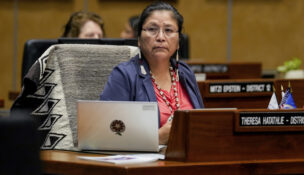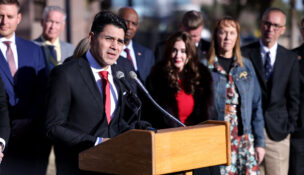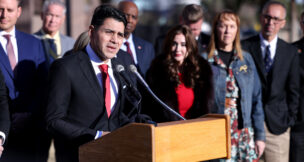Affordable housing bill passes committee, cities have alternate version
Jakob Thorington Arizona Capitol Times//January 28, 2025//
Affordable housing bill passes committee, cities have alternate version
Jakob Thorington Arizona Capitol Times//January 28, 2025//
A new version of a bipartisan housing measure intended to help first-time homebuyers purchase starter properties advanced through a House panel Tuesday, but it may have to compete with an alternative proposal from Arizona’s cities and towns looking to achieve the same goal.
The House Commerce Committee on Tuesday passed HB2371, this year’s version of the “Arizona Starter Homes Act,” as lawmakers are preparing to negotiate with municipal leaders to avoid last year’s veto outcome.
“This is the start of the process,” said the bill’s sponsor Rep. Leo Biasiucci, R-Lake Havasu City, said. “We need to figure something out.”
The measure would prevent cities from regulating specific design features of homes, including walls, fences, garages and specific building materials used for construction. Under the bill, cities also couldn’t require minimum lot sizes to be built any larger than 1,500 square feet for new developments that are at least five acres in size.
It is nearly identical to last year’s version of the bill, which was vetoed by Gov. Katie Hobbs and widely opposed by municipalities.
This year’s bill now includes a provision to address a concern from the U.S. Department of Defense of allowing higher density zones near military installations, primarily Luke Air Force Base located west of Glendale.
One of the main holdups of the bill is the difference in opinion to go about addressing housing affordability between municipal leaders and homebuilders.
“Starter homes have been outlawed in many communities, especially in the greater Phoenix metro area,” said Spencer Kamps, the vice president of Legislative Affairs for the Home Builders Association of Central Arizona.
Kamps referenced a specific project a builder has proposed in San Tan Valley for $260,000. He said adding a garage to the home would bump the price up to $350,000 but the builder has repeatedly been denied getting the project approved by municipalities in the Phoenix area.
“They never get to the (city council) because staff says no,” Kamps said. “We want entry-level housing.”
But city leaders say there’s no guarantee the Starter Homes Act will result in affordable units being built since the measure doesn’t include a provision that conditionally requires lower prices for homes.
Nick Ponder, the senior vice president for governmental affairs at HighGround Public Affairs Consultants, lobbying for the League of Arizona Cities and Towns, said another major concern for cities is that there’s nothing in the bill that would prevent starter homes from being bought by corporations to then be sold at a higher price.
“In reducing lot sizes, that doesn’t necessarily translate to affordability,” Ponder said. “A 5,000 square foot lot in Queen Creek is $400,000 or $350,000.”
The median home price in Arizona as of December was about $450,000 according to the real estate brokerage Redfin. That’s an increase from $287,000 from December 2019.
Supporters of the bill say the lower lot sizes would naturally lead to lower home prices, since less materials are being used to construct homes.
“You have builders that want to bring these homes to market but can’t. They can’t do it,” said Jake Hinman, a political strategist with Mavrik Policy Group representing the Arizona Neighborhood Project.
The bill would only apply to cities with a population of over 70,000, which mostly applies to municipalities within the greater Phoenix metro. Biasiucci said he would like to take the population minimum requirement off but it was the figure that got him enough votes to get the measure out of both the House and Senate last year.
Both Reps. Walt Blackman, R-Snowflake; and Janeen Connolly, D-Tempe, said during the commerce committee hearing that they would like to see affordable housing policy extended to smaller municipalities.
“Not one mention of the places I represent,” Blackman said. “Are we just going to get the scraps at the table in Legislative District 7?”
An alternate “Starter Homes Act.”
Officials from the League of Arizona Cities and Towns provided details to the Arizona Capitol Times of an alternate bill to Biasiucci’s measure Tuesday. The bill has not been filed yet but the measure has been sent to the Legislative Council to fine tune the language of the measure.
The League’s bill has the same goal of increasing the amount of affordable housing supply. Tom Savage, the legislative director for the League, said Tuesday the League is looking at a slightly bigger minimum lot size of 4,000 square feet, which would better allow cities to regulate density and ensure new homes have appropriate city services.
To address the League’s main issue of guaranteed housing affordability within the bill, is the measure would implement a provision that requires developers to sell properties to an individual or family who makes no more than 120% of the area median income the home is located in.
HB2371 proposes a 10-foot distance, or setback, in front and behind structures from the property line. The League’s bill proposes a reduced setback as well but Savage said it won’t be as small as 10 feet. The legislation also gives cities some flexibility to require certain design features like a patio or a specific type of landscaping
“(HB2371) tries to apply a one-size-fits all to say Buckeye is no different than Phoenix. That’s not the case,” Savage said. “If it’s affordable, it will be met with a relaxing of regulatory requirements and zoning requirements to achieve that affordability.”
League officials didn’t say who is sponsoring their legislation since the sponsor doesn’t want to be named yet.
The League would also like to remove a provision from any proposal that goes forward that states the “statewide housing crisis is caused in no small part by highly restrictive regulations imposed by municipalities,” like HB2371 does.
In the last five years, Arizona cities and towns have authorized more than 350,000 housing units, according to data from the U.S. Census. League Deputy Director Rene Guillen told the Arizona Capitol Times that 220,000 of those units have been completed.
House Commerce Committee Chairman Rep. Jeff Weninger, R-Chandler, urged cities and homebuilders to work with Biasiucci to get agreeable legislation to the governor’s desk.
“He (Biasiucci) wants a bill signed. I think he wants to get something done and I’m not sure in the present form, that’s going to pass this test. So I look forward to hopefully some compromise,” Weninger said.














































